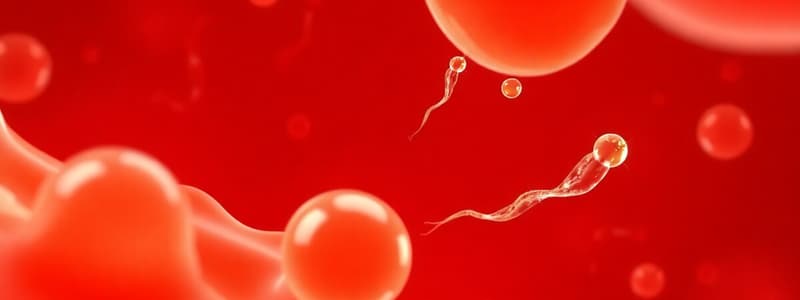Podcast
Questions and Answers
What is the primary purpose of the activation of the oocyte following sperm penetration?
What is the primary purpose of the activation of the oocyte following sperm penetration?
Which of the following describes the fast block to polyspermy?
Which of the following describes the fast block to polyspermy?
What process follows fertilization, leading to the formation of the multicellular structure?
What process follows fertilization, leading to the formation of the multicellular structure?
How does the slow block to polyspermy reinforce the prevention of multiple fertilizations?
How does the slow block to polyspermy reinforce the prevention of multiple fertilizations?
Signup and view all the answers
Which of the following accurately describes the morula stage of cleavage?
Which of the following accurately describes the morula stage of cleavage?
Signup and view all the answers
Study Notes
Fertilization Process
- Sperm migrate through the female reproductive tract, guided by signals from the egg; only a small percentage reach the oocyte.
- Capacitation prepares sperm to penetrate the egg, increasing motility and readying the acrosome.
- Sperm bind to ZP3 receptors in the zona pellucida, a glycoprotein layer surrounding the egg.
- Acrosomal reaction releases enzymes that break down the zona pellucida, allowing sperm entry.
- Sperm and egg membranes fuse, allowing the sperm's nucleus to enter the oocyte.
Activation of the Oocyte and Prevention of Polyspermy
- Cortical reaction prevents multiple sperm from fertilizing the egg by releasing enzymes that modify the zona pellucida making it impenetrable to other sperm.
- The oocyte completes meiosis II, producing a mature ovum and a polar body.
- Intracellular calcium wave initiates a cascade of biochemical and structural changes in the oocyte, triggered by sperm entry.
Formation of the Zygote
- Pronuclei fuse, combining genetic material (46 chromosomes in humans) to form a zygote.
- Zygote undergoes cleavage (rapid mitotic divisions) leading to development.
Cleavage Stages
- Initial cleavage (first 24-36 hours) produces two blastomeres.
- Subsequent divisions rapidly increase cell numbers and compact the cells.
- Eight-cell stage shows cell compaction.
- Morula stage (16-32 cells): solid mass of cells without growth.
Blastocyst Formation
- Cavitation forms a fluid-filled blastocoel, transforming the morula into a blastocyst.
- Blastocyst has two cell types: inner cell mass (ICM) which forms the embryo; trophblast forming the placenta.
- Zona pellucida disappears, allowing blastocyst implantation in the uterine wall.
Prevention of Polyspermy
- Fast block: membrane depolarization immediately after sperm entry to prevent other sperm fusion with the egg’s membrane.
- Slow block: cortical reaction hardens and inactivates sperm binding receptors on the zona pellucida; a more permanent block.
Studying That Suits You
Use AI to generate personalized quizzes and flashcards to suit your learning preferences.
Related Documents
Description
Explore the intricate steps of the fertilization process, including sperm migration, oocyte activation, and zygote formation. This quiz covers essential biological concepts such as capacitation, the acrosomal reaction, and prevention of polyspermy. Test your knowledge of these fundamental processes in reproductive biology.




